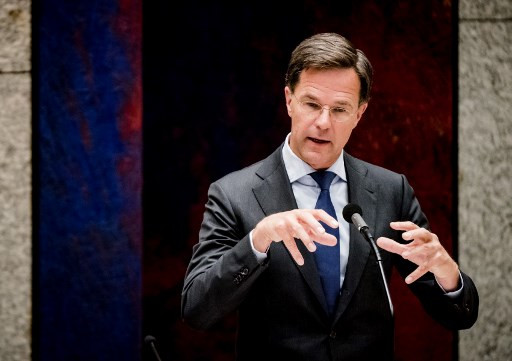Popular Reads
Top Results
Can't find what you're looking for?
View all search resultsPopular Reads
Top Results
Can't find what you're looking for?
View all search results'Mr. No, No, No' - Why Dutch PM Rutte plays role of EU bogeyman
Change text size
Gift Premium Articles
to Anyone
 Dutch Prime Minister Mark Rutte speaks during the debate about the developments surrounding the coronavirus crisis in the Hague, the Netherlands, on June 4, 2020.As EU negotiations over a coronavirus recovery fund and a new budget for the bloc ran into an impasse, Netherlands Prime Minister Mark Rutte was singled out by one leader this weekend as the "man responsible for the whole mess". (ANP/AFP/Bart Maat )
Dutch Prime Minister Mark Rutte speaks during the debate about the developments surrounding the coronavirus crisis in the Hague, the Netherlands, on June 4, 2020.As EU negotiations over a coronavirus recovery fund and a new budget for the bloc ran into an impasse, Netherlands Prime Minister Mark Rutte was singled out by one leader this weekend as the "man responsible for the whole mess". (ANP/AFP/Bart Maat )
A
s EU negotiations over a coronavirus recovery fund and a new budget for the bloc ran into an impasse, Netherlands Prime Minister Mark Rutte was singled out by one leader this weekend as the "man responsible for the whole mess".
Hungarian Prime Minister Viktor Orban accused him of that, while Spanish and Italian diplomats have taken to calling him "Mr. No No No!".
Standing up for not spending money on European projects requires a naysayer, and Rutte has taken on the role with calculated determination as leader of a group of smaller "frugal" nations.
While he may cut a less colorful figure than Margaret Thatcher a generation ago, Rutte's readiness to don the mantle of parsimony after Britain's departure from the EU is solidly grounded in public opinion and politics at home.
The Dutch, who support EU membership by a two-thirds majority, take pride in both their history as a trading nation and their traditional Calvinist thrift.
Dutch taxpayers are aware that they are proportionately among the largest contributors to the EU budget, and the idea of giving or lending more is unpopular.
The "Mr. No" moniker derives from an April video clip, frequently retweeted, that shows a Dutch waste collector shouting at Rutte not to give money to "those Italians and French".
"Oh, no, no, no." Rutte replied. "I will remember this."
Critics say the Dutch reluctance to spend now is misplaced, given the country's large trade surplus with the rest of the EU. Unicredit economist Erik Nielsen argued in a note on Sunday that the Dutch 2018 net budget contribution of 2.4 billion euros "tells only a small part of the real financial story".
"According to the Tax Justice Network, that same year, the Netherlands’ tax haven structures helped them grab 6.7 billion euros in tax receipts from Germany, France, Italy and Spain," he wrote.
But conversations in the Netherlands more often focus on whether Dutch prosperity is the result of a tougher work ethic, and whether it is fair to share funds with countries that have a lower retirement age.
Domestic politics also play a role. With national elections looming in March, Rutte's conservative VVD Party must jockey with far-right parties for exactly those voters most likely to be euro-skeptic.
In addition, his current center-right coalition lacks a majority in parliament. Any compromise struck in Brussels now that goes too far in the eyes of the Dutch might not be ratified later in The Hague.
This rejection happened in 2005 and again, to a deal Rutte had agreed to, in 2016.









